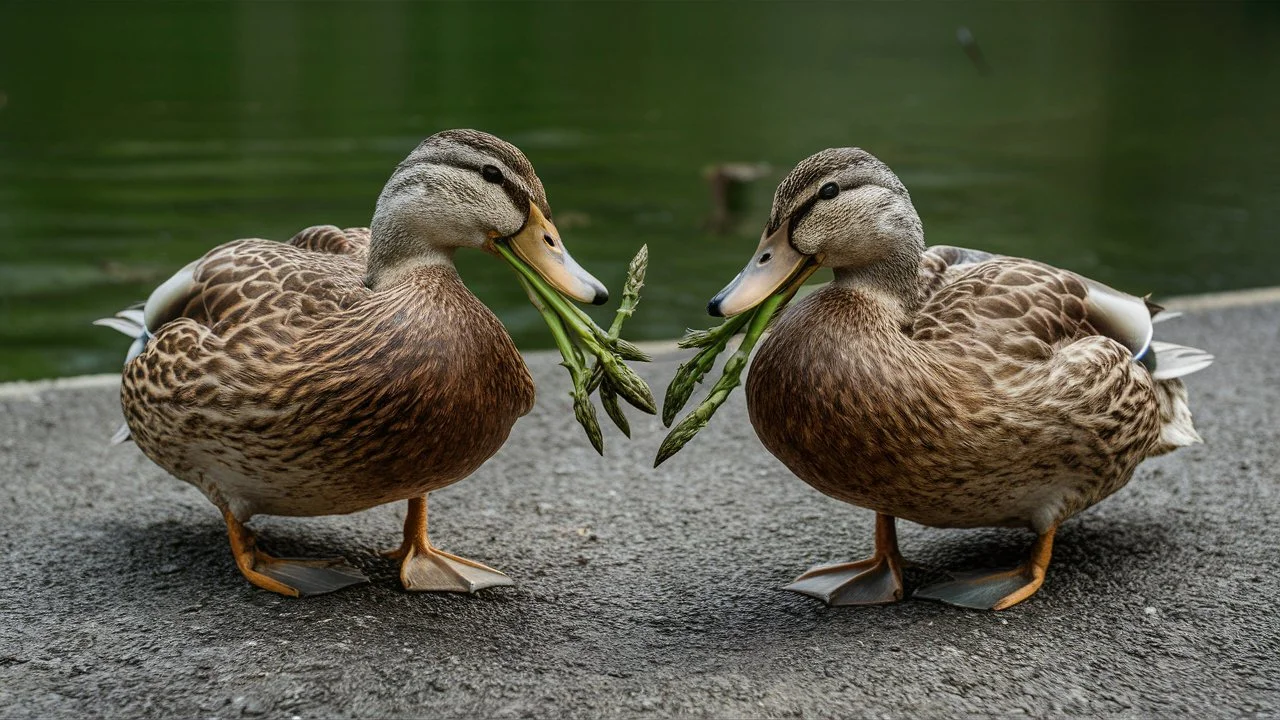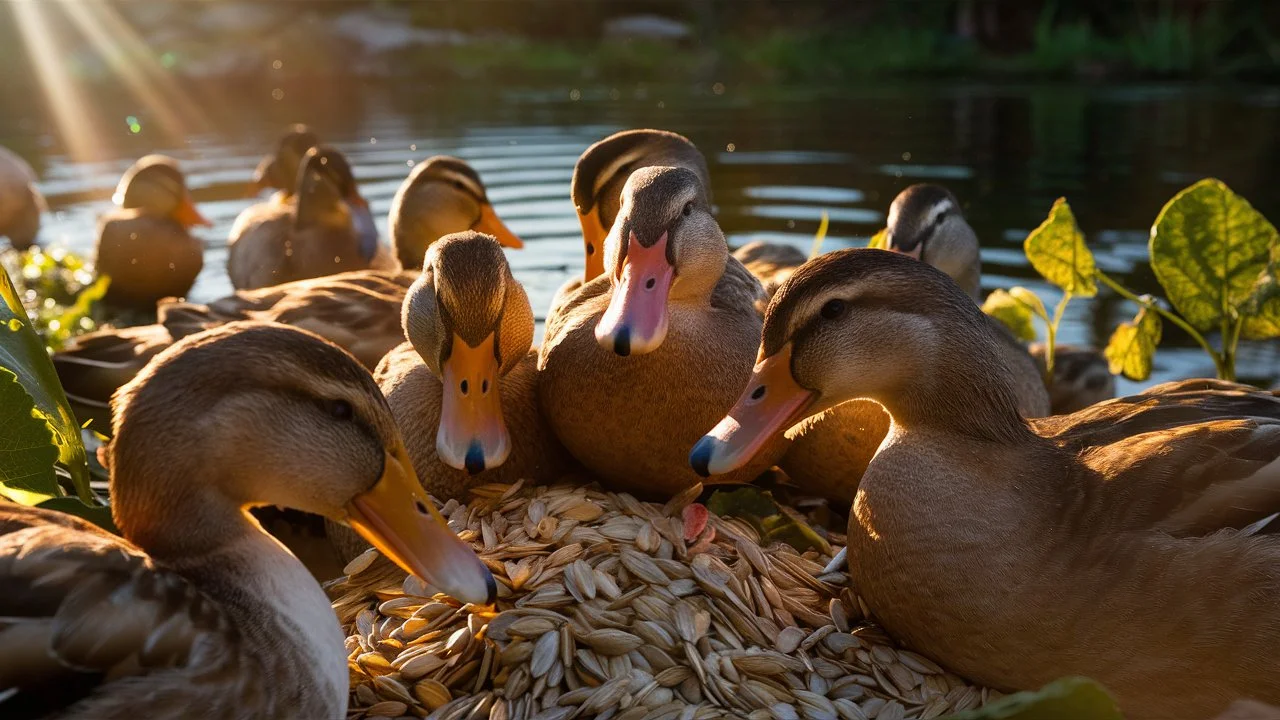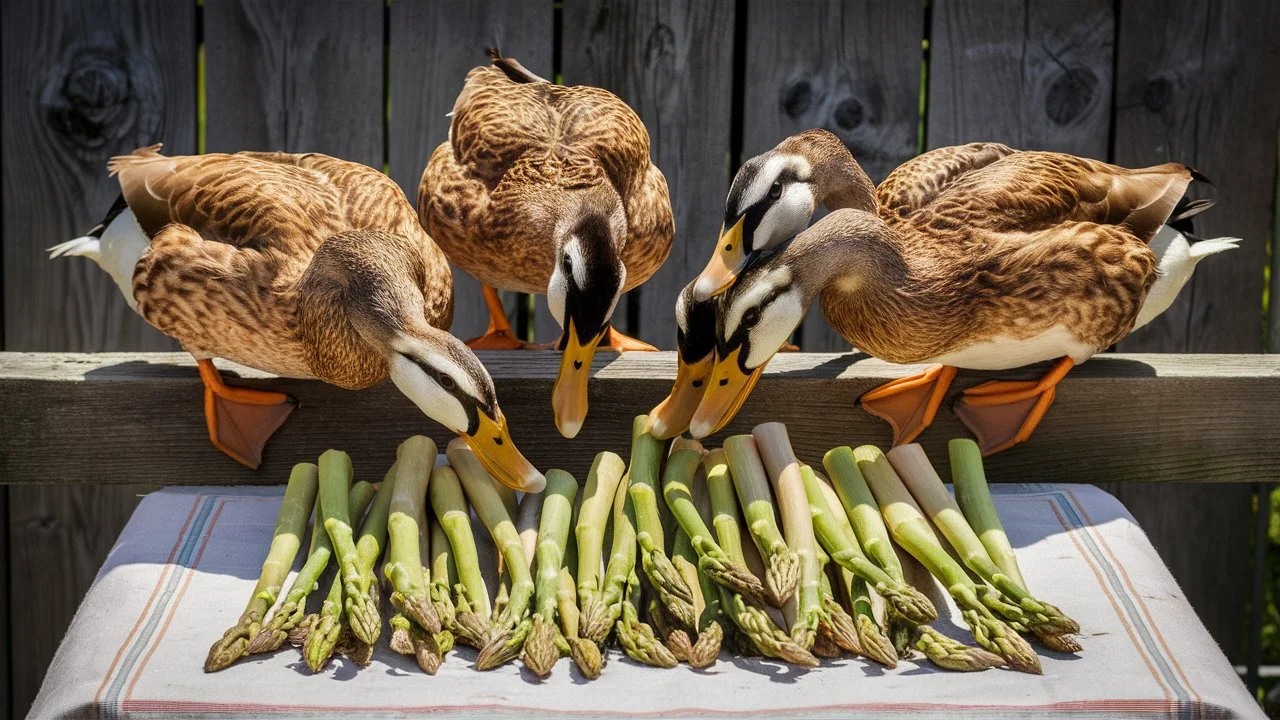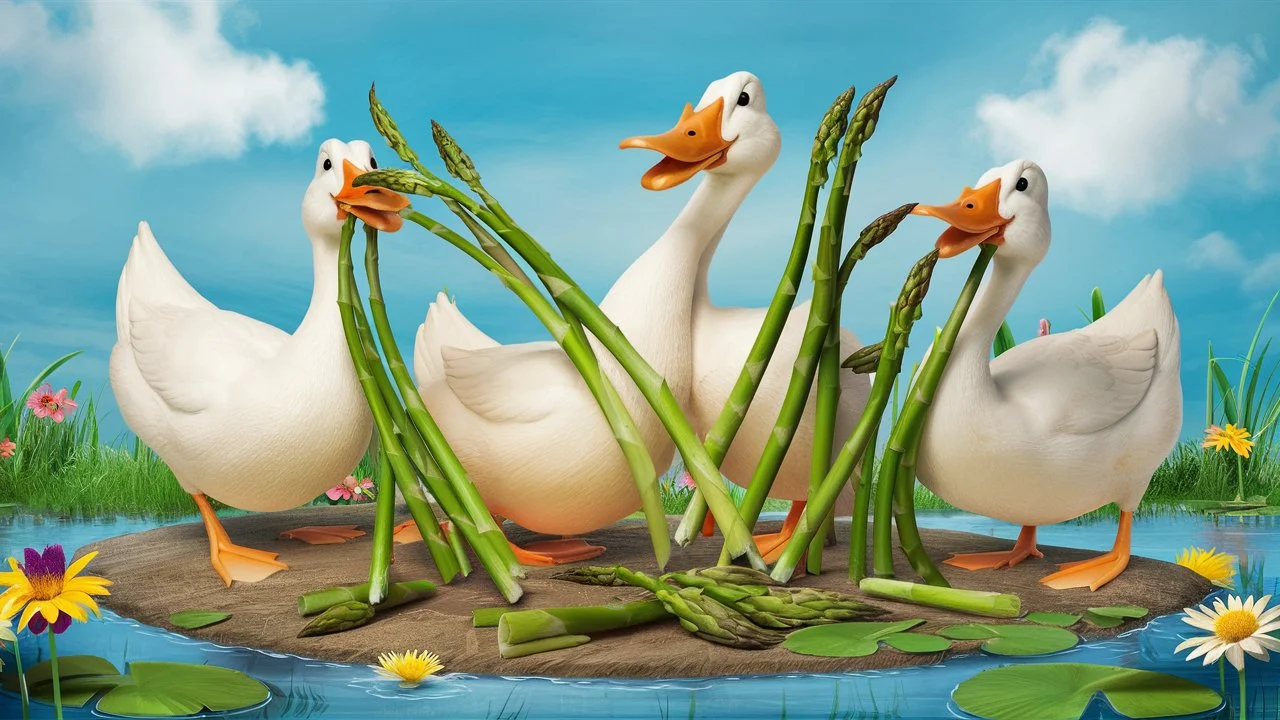As a duck owner or someone interested in waterfowl, you might wonder about the variety of foods that can be safely included in their diet. One such question that often arises is whether ducks can eat asparagus. This intriguing vegetable, known for its rich nutritional profile, is a common staple in human diets, but can it be beneficial for ducks as well?
Understanding the potential benefits and considerations of feeding asparagus to ducks can help ensure their diet remains safe, balanced, and nutritious. In this guide, we will explore the suitability of asparagus for ducks, including its nutritional benefits, proper preparation, and any risks to be aware of.
Yes, ducks can eat asparagus. It is safe and nutritious for them when fed in moderation. Ensure the asparagus is washed thoroughly and cut into small pieces to prevent choking. Both raw and cooked asparagus are suitable, but avoid adding any seasonings or oils. Always introduce new foods gradually and observe your ducks for any adverse reactions.
Can Ducks Eat Asparagus?
As a duck owner or someone interested in waterfowl, you might wonder about the dietary options available for these fascinating creatures. One such question that often arises is whether ducks can safely consume asparagus. This guide delves into the nutritional benefits, potential risks, and best practices for feeding asparagus to ducks.
Related reading:Do Ducks Land in Trees?

Nutritional Benefits of Asparagus
Asparagus is a nutrient-rich vegetable that offers several benefits for both humans and animals. Here are some of the key nutrients found in asparagus:
- Vitamins: Asparagus is rich in vitamins A, C, E, and K. Vitamin A is essential for maintaining healthy vision and immune function. Vitamin C is a powerful antioxidant that supports the immune system and helps in the repair of tissues. Vitamin E protects cells from damage, and vitamin K plays a crucial role in blood clotting and bone health.
- Folate: This B vitamin is important for cell division and the formation of DNA, making it crucial for growth and development.
- Fiber: Dietary fiber aids in digestion and helps maintain a healthy digestive system.
- Minerals: Asparagus contains several important minerals, including potassium, which helps regulate fluid balance and muscle contractions, and iron, which is essential for the formation of red blood cells.
Can Ducks Eat Asparagus?
Yes, ducks can eat asparagus, and it can be a healthy addition to their diet. However, there are some considerations to keep in mind to ensure it is provided safely and beneficially.
Benefits of Feeding Asparagus to Ducks
- Nutritional Boost: As mentioned, asparagus is packed with vitamins and minerals that can complement the duck’s regular diet.
- Variety: Adding different types of vegetables, including asparagus, can provide variety in a duck’s diet, preventing them from getting bored with their food.
- Digestive Health: The fiber content in asparagus can aid in digestion and promote a healthy gut.
How to Feed Asparagus to Ducks
While asparagus can be beneficial, it should be introduced and served properly. Here are some tips for feeding asparagus to ducks:
- Introduce Gradually: When introducing any new food to your ducks, start with small amounts to ensure they tolerate it well. Observe for any signs of digestive upset or allergic reactions.
- Preparation: Cut the asparagus into small, manageable pieces. This helps prevent choking and makes it easier for the ducks to eat.
- Raw vs. Cooked: Both raw and cooked asparagus can be fed to ducks. However, if you choose to cook it, avoid adding any seasonings, oils, or butter, as these can be harmful to ducks.
- Moderation: While asparagus is nutritious, it should be fed in moderation. Ducks require a balanced diet, primarily consisting of a good quality waterfowl feed, supplemented with vegetables, fruits, and other safe treats.
- Clean and Fresh: Ensure the asparagus is clean and free from pesticides or chemicals. Offer fresh asparagus and remove any uneaten portions to prevent spoilage.
Potential Risks of Feeding Asparagus to Ducks
While asparagus is generally safe for ducks, there are a few potential risks to consider:
- Digestive Upset: Some ducks may have a sensitive digestive system and might experience upset if they eat too much asparagus or if it is introduced too quickly.
- Pesticides: Asparagus, like other vegetables, can contain pesticides. Always wash it thoroughly or consider purchasing organic asparagus to minimize this risk.
- Choking Hazard: Large pieces of asparagus can pose a choking hazard. Always cut it into small, manageable pieces.
Other Safe Vegetables for Ducks
In addition to asparagus, there are several other vegetables that are safe and nutritious for ducks:
- Leafy Greens: Spinach, kale, and lettuce are excellent choices. They are rich in vitamins and minerals and can be fed raw.
- Peas: Fresh or frozen peas (thawed) are a favorite among ducks. They are easy to eat and provide essential nutrients.
- Carrots: Grated or finely chopped carrots are a good source of beta-carotene and other vitamins.
- Pumpkin and Squash: These can be fed raw or cooked. They are rich in vitamins and fiber.
- Cucumber: Sliced cucumber is hydrating and low in calories, making it a refreshing treat.
Foods to Avoid
While many vegetables are safe for ducks, some should be avoided due to potential toxicity or digestive issues:
- Avocado: Contains persin, which is toxic to birds, including ducks.
- Onion and Garlic: Can cause digestive upset and toxicity in ducks.
- Green Potatoes and Tomato Leaves: Contain solanine, a toxic compound.
- Rhubarb: Contains oxalic acid, which can be harmful.
Balanced Diet for Ducks
A balanced diet is crucial for the health and well-being of ducks. Their primary diet should consist of a high-quality commercial waterfowl feed, which is formulated to meet their nutritional needs. In addition to their staple feed, ducks benefit from a variety of safe fruits, vegetables, and occasional protein sources.
Treats and Supplements
While vegetables like asparagus can be a healthy addition, treats should only make up a small portion of a duck’s diet. Overfeeding treats can lead to nutritional imbalances and health issues. Here are some guidelines for offering treats and supplements:
- Frequency: Offer treats a few times a week rather than daily.
- Portion Size: Treats should make up no more than 10% of the duck’s overall diet.
- Variety: Provide a variety of treats to ensure a broad range of nutrients.
Observing Your Ducks
When introducing new foods, including asparagus, it is important to observe your ducks for any changes in behavior or health. Signs that a food might not agree with them include:
- Digestive Upset: Diarrhea or changes in droppings.
- Loss of Appetite: Reduced interest in food.
- Behavioral Changes: Lethargy or unusual behavior.
If you notice any of these signs, discontinue the new food and consult a veterinarian if necessary.
Can Ducks Eat Asparagus Seeds?
When considering whether ducks can eat asparagus seeds, it’s important to evaluate the safety and nutritional value of the seeds themselves. While asparagus stems and tips are generally safe and nutritious for ducks, the seeds present a different consideration.

Asparagus Seeds and Ducks
- Toxicity Concerns: Asparagus seeds are generally not considered safe for consumption by ducks or other animals. They contain compounds that can be toxic and cause digestive distress.
- Nutritional Value: Unlike the edible parts of the asparagus plant, the seeds do not offer significant nutritional benefits to ducks.
- Risk of Choking: Seeds can pose a choking hazard, especially for smaller birds like ducks. It’s essential to ensure that anything given to ducks is safe and easy for them to eat.
Best Practices for Feeding Ducks
To ensure the health and safety of your ducks, it’s best to avoid feeding them asparagus seeds. Instead, focus on providing parts of the plant that are known to be safe and beneficial. Here are some tips:
- Safe Parts of Asparagus: Offer the stems and tips of asparagus, which are rich in vitamins and minerals.
- Preparation: Wash the asparagus thoroughly and cut it into small, manageable pieces to prevent choking.
- Balanced Diet: Ensure that asparagus is only a part of a varied and balanced diet. Ducks should primarily consume high-quality commercial waterfowl feed, supplemented with safe vegetables, fruits, and occasional protein sources.
Safe Vegetables for Ducks
In addition to asparagus, here are some other vegetables that are safe and nutritious for ducks:
- Leafy Greens: Spinach, kale, and lettuce are rich in vitamins and minerals.
- Peas: Fresh or thawed frozen peas are a favorite among ducks.
- Carrots: Grated or finely chopped carrots are a good source of beta-carotene and other vitamins.
- Pumpkin and Squash: These can be fed raw or cooked and are rich in vitamins and fiber.
- Cucumber: Sliced cucumber is hydrating and low in calories, making it a refreshing treat.
Foods to Avoid
Ensure you avoid feeding ducks foods that can be harmful:
- Avocado: Contains persin, which is toxic to birds.
- Onion and Garlic: Can cause digestive upset and toxicity.
- Green Potatoes and Tomato Leaves: Contain solanine, a toxic compound.
- Rhubarb: Contains oxalic acid, which can be harmful.
Can Ducks Eat Asparagus Raw?
Yes, ducks can eat raw asparagus, and it can be a healthy and nutritious addition to their diet. Asparagus is packed with vitamins and minerals that are beneficial for ducks. Here’s a detailed look at the benefits and considerations of feeding raw asparagus to ducks.

Nutritional Benefits of Asparagus
Raw asparagus offers several nutritional benefits:
- Vitamins: Raw asparagus is rich in vitamins A, C, E, and K. These vitamins are essential for maintaining healthy vision, immune function, cell protection, and blood clotting.
- Folate: This B vitamin is important for cell division and DNA formation, crucial for growth and development.
- Fiber: The dietary fiber in raw asparagus aids in digestion and helps maintain a healthy digestive system.
- Minerals: Asparagus contains important minerals like potassium, which helps regulate fluid balance and muscle contractions, and iron, essential for red blood cell formation.
Benefits of Feeding Raw Asparagus to Ducks
- Nutritional Value: Raw asparagus retains all its vitamins and minerals, providing maximum nutritional benefits.
- Digestive Health: The fiber in raw asparagus can aid in digestion and promote a healthy gut.
- Natural Food: Feeding ducks raw asparagus mimics their natural diet, which includes various raw plants and vegetables.
How to Feed Raw Asparagus to Ducks
While raw asparagus can be beneficial, it should be provided properly to ensure safety and enjoyment:
- Wash Thoroughly: Always wash asparagus thoroughly to remove any pesticides or dirt.
- Cut into Small Pieces: Chop the asparagus into small, manageable pieces to prevent choking and make it easier for ducks to eat.
- Introduce Gradually: Start with small amounts to ensure your ducks tolerate it well. Monitor for any signs of digestive upset or allergic reactions.
- Moderation: Feed raw asparagus in moderation as part of a balanced diet. It should complement, not replace, their regular feed.
Observing Your Ducks
When introducing raw asparagus or any new food, it’s important to observe your ducks for any adverse reactions. Look out for:
- Digestive Issues: Watch for changes in droppings, such as diarrhea.
- Behavioral Changes: Notice if they seem lethargic or uninterested in other foods.
Balanced Diet for Ducks
While raw asparagus can be a healthy treat, it should only be a small part of a duck’s overall diet. Ducks need a balanced diet primarily consisting of high-quality commercial waterfowl feed. Supplement their diet with a variety of safe vegetables, fruits, and occasional protein sources.
Other Safe Vegetables for Ducks
In addition to raw asparagus, there are several other vegetables that are safe and nutritious for ducks:
- Leafy Greens: Spinach, kale, and lettuce are excellent choices. They are rich in vitamins and minerals and can be fed raw.
- Peas: Fresh or frozen peas (thawed) are a favorite among ducks. They are easy to eat and provide essential nutrients.
- Carrots: Grated or finely chopped carrots are a good source of beta-carotene and other vitamins.
- Pumpkin and Squash: These can be fed raw or cooked. They are rich in vitamins and fiber.
- Cucumber: Sliced cucumber is hydrating and low in calories, making it a refreshing treat.
Foods to Avoid
While many vegetables are safe for ducks, some should be avoided due to potential toxicity or digestive issues:
- Avocado: Contains persin, which is toxic to birds, including ducks.
- Onion and Garlic: Can cause digestive upset and toxicity in ducks.
- Green Potatoes and Tomato Leaves: Contain solanine, a toxic compound.
- Rhubarb: Contains oxalic acid, which can be harmful.
Conclusion
In summary, ducks can safely eat asparagus, and it can be a beneficial addition to their diet when fed in moderation. Asparagus provides essential vitamins and minerals that can support the overall health of your ducks. However, it is crucial to introduce it gradually, ensure it is properly prepared, and maintain a balanced diet for your ducks. By offering a variety of safe foods and observing your ducks’ reactions, you can ensure they enjoy a healthy and nutritious diet

